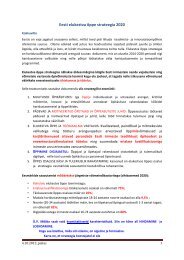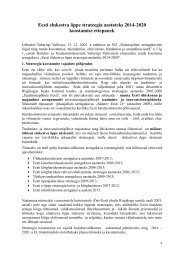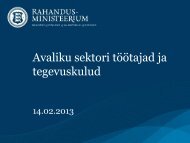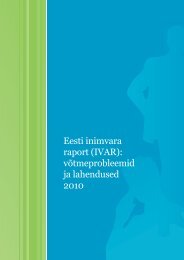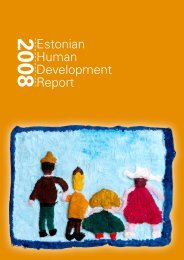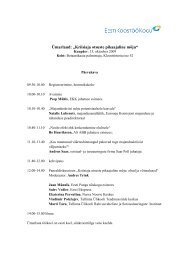DEVELOPMENT
The pdf-version - Eesti Koostöö Kogu
The pdf-version - Eesti Koostöö Kogu
You also want an ePaper? Increase the reach of your titles
YUMPU automatically turns print PDFs into web optimized ePapers that Google loves.
Figure 2.1.1<br />
The world’s most successful transition countries 2012 (based on the positions in the Bertelsmann Transformation Index)<br />
Status Index Political transformation result Economic transformation result Process management index<br />
45<br />
45<br />
40<br />
40<br />
35<br />
35<br />
30<br />
30<br />
25<br />
25<br />
Bertelsmann Transformation Index<br />
20<br />
15<br />
10<br />
5<br />
0<br />
20<br />
15<br />
10<br />
5<br />
0<br />
Czech Republic<br />
Taiwan<br />
Slovenia<br />
Uruguay<br />
Estonia<br />
Poland<br />
Lithuania<br />
Slovakia<br />
Chile<br />
Costa Rica South-Korea<br />
Hungary<br />
Latvia<br />
political and economies systems, in order to ensure the<br />
sustainability of the achieved levels of development (Bertelsmann<br />
2012: 19).<br />
Based on the Status Index, the remaining 115 states<br />
under observation are divided into four groups: developed<br />
states; states with limited development: and states<br />
with severely limited development; as well as states with<br />
blocked, or failed, development. Bulgaria and Romania,<br />
the newest EU Member States, have been classified among<br />
the developed states. Based on the 2012 Status Index,<br />
Russia is a state with limited development and ranked<br />
65 th . Two years earlier, it was also in 65 th position; earlier,<br />
it was in 59 th and 47 th . The research results have been<br />
thoroughly analysed by region, by comparing the development<br />
trends to date, and by highlighting the future<br />
risks and opportunities.<br />
In the case of Eastern, Central and South-Eastern<br />
Europe (17 states), the greatest risk factors for future<br />
development are the narrowing of the opportunities<br />
for politicians to act, and increased restrictions placed<br />
on the freedom of choice of the member states by the<br />
EU and other international economic organisations, on<br />
the one hand; and the disenchantment and disappointment<br />
of the public, related to political development, on<br />
the other hand. In the Central and Eastern European<br />
states, innovative development may also be slowed<br />
down by an excessive dependence on foreign capital.<br />
The sustainability of democratic development may be<br />
negatively affected by the immaturity of civil society,<br />
a low level of trust in the political institutions, and<br />
large generational differences, as well as a high emigration<br />
rate. Along with the continued narrowing of<br />
opportunities, many of the politicians in this region<br />
waver between populist promises and the cultivation<br />
of technocratic policies.<br />
Under these conditions, the development of education<br />
and research activities are strategically important.<br />
This field of activity provides the smallest states in the<br />
region with the best opportunities for influencing their<br />
future outlooks in the global division of labour and<br />
competition.<br />
At the same time, the analysis related to the Bertelsmann<br />
Transformation Index shows that the majority of<br />
the states in the region are not sufficiently dedicated to<br />
developing strategic plans for the future that could ensure<br />
sustainable development (Bertelsmann 2012: 111).<br />
Unfortunately, this conclusion totally applies to<br />
Estonia also.<br />
References<br />
1. Bertelsmann 2004 – Bertelsmann Transformation Index 2003:<br />
Auf dem Weg zur marktwirschaftlichen Demokratie. Gütersloh:<br />
Bertelsmann Stiftung. A large part available electronically –<br />
www.bertelsmann-stiftung.de<br />
2. Bertelsmann 2005 – Bertelsmann Transformation Index 2006:<br />
Auf dem Weg zur marktwirschaftlichen Demokratie. Gütersloh:<br />
Bertelsmann Stiftung. A large part available electronically –<br />
www.bertelsmann-stiftung.de<br />
3. Bertelsmann 2008 – Bertelsmann Transformation Index 2008:<br />
Political Management in International Comparison. Gütersloh:<br />
Bertelsmann Stiftung. A large part available electronically –<br />
www.bertelsmann-stiftung.de<br />
4. Bertelsmann 2009 – Bertelsmann Transformation Index 2010:<br />
Political Management in International Comparison. Gütersloh:<br />
Bertelsmann Stiftung. S A large part available electronically –<br />
www.bertelsmann-stiftung.de<br />
5. Bertelsmann 2012 – Transformation Index BTI 2012: Political<br />
Management in International Comparison. Gütersloh: Bertelsmann<br />
Stiftung. A large part available electronically – www.<br />
bti-project.de<br />
66<br />
Estonian Human Development Report 2012/2013



